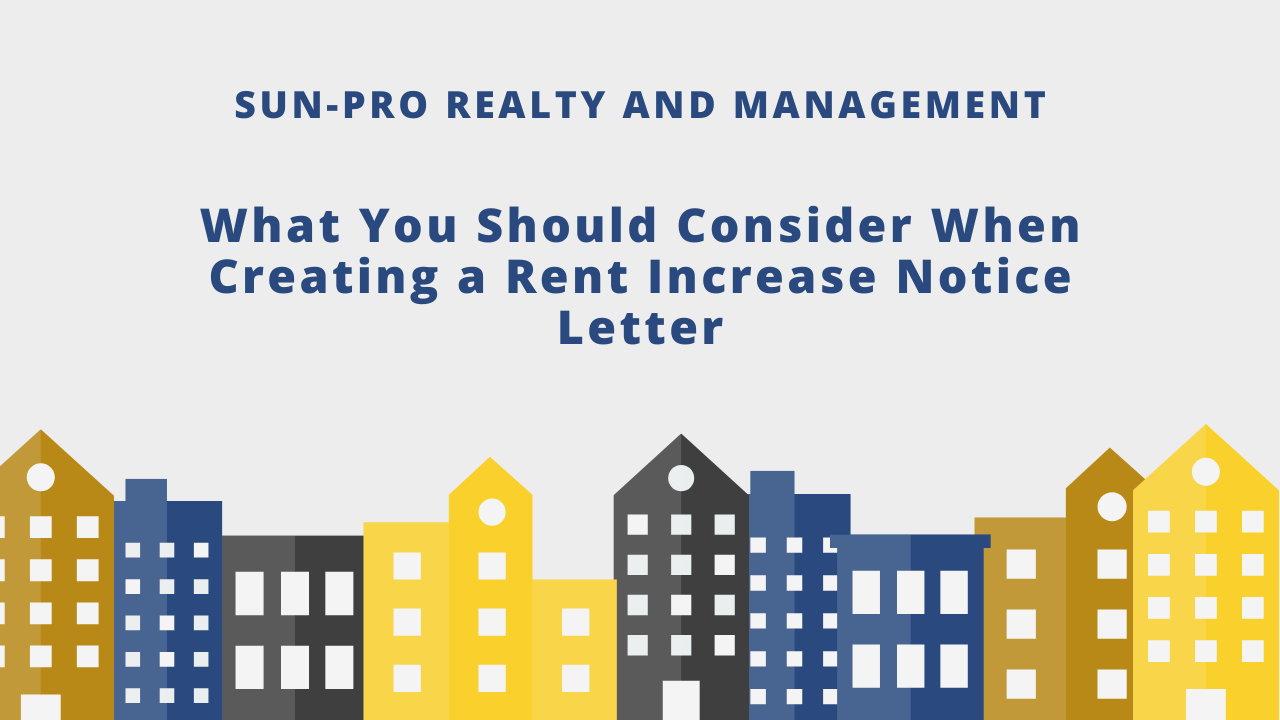
Key Takeaways
- Clear Communication: Always provide a well-crafted rent increase notice, explaining the reason, effective date, and legal notice period.
- Research and Compliance: Ensure your rent increase aligns with market rates and follow local laws, giving tenants 30 to 60 days' notice.
- Justify Increases: Offer clear reasons, like inflation or property upgrades, to maintain tenant satisfaction and avoid retaliatory increases.
Raising rent is sometimes an unavoidable part of being a landlord, whether due to rising inflation, increased maintenance costs, property taxes, or improvements to the property. But while necessary, it’s a process that should be approached thoughtfully.
At Sun-Pro Realty and Management, we understand that clear communication is key to maintaining positive tenant relationships. A well-crafted rent increase notice helps explain the reasons for the adjustment, sets expectations, and ensures a smooth transition for both parties.
Keep reading to learn how to write an effective rent increase notice and navigate the process with confidence.
What is a Rent Increase Letter?
A rent increase letter is a formal notice a landlord sends to inform a tenant of an upcoming rent hike. It explains the reason for the increase, states when it will take effect, usually after the current lease ends, and provides a written record of the change.
To avoid legal issues or tenant disputes, it's important to follow any applicable state or local laws, which may set limits on how much rent can be raised and how much advance notice is required.
For instance, while Florida law doesn’t specify a required notice period, giving 30 to 60 days’ notice is a standard and respectful practice that allows tenants time to prepare.
What is the Maximum Rent Raise a Landlord can make?
Florida does not have rent control laws, nor do local jurisdictions have the authority to implement their own rent control measures. This means that, technically, you can raise rent by any amount and as often as you wish.

However, it's important to balance the increase with the market’s demand. Excessive rent hikes can make your property less attractive to potential tenants, leading to higher turnover rates and extended vacancies, which could hurt your profitability.
Generally, a reasonable rent increase tends to fall between 3% and 5% annually. For example, if your current rent is $2,000 per month, a 3% to 5% increase would amount to an additional $60 to $100, bringing the new rent to between $2,060 and $2,100 once the lease term ends.
What Factors Often Justify a Rent Increase?
As a landlord, you can raise rent for any reason, and you’re not required to provide justification.
However, to retain a good tenant, it’s often wise to offer an explanation. After all, finding a reliable tenant isn’t always easy, and the last thing you want is to lose them due to an unexplained rent increase.
Here are some common reasons landlords give when raising rent:
- High inflation rates: Rising inflation can impact your profits and return on investment (ROI). To offset these effects, you might raise rent to keep pace with inflation.
- Rising utility bills and maintenance costs: Utility and maintenance costs are largely outside a landlord’s control. If vendor fees increase, you may need to raise rent accordingly to cover those added expenses.
- Rental upgrades: Rental upgrades are a solid reason for raising rent. If you’ve renovated the property, whether it's a modernized kitchen, upgraded appliances, or new flooring, these improvements can justify a higher rent.
- Property taxes: If property taxes increase, passing on a portion of that cost to the tenant through a rent raise can help protect your profit margins.
Regardless of the reason, it’s important to clearly communicate your justification. If you don’t, tenants may perceive the increase as unreasonable and could decide to move out when given the chance.

What Should You Keep in Mind When Raising Rent?
When considering a rent increase, there are several important factors to keep in mind to ensure a smooth and legally compliant process. Here are key points to remember when drafting your rent increase notice letter:
Provide Advance Notice
Most states require landlords to give tenants advance notice before raising the rent. Typically, this notice period ranges between 30 and 60 days, depending on local laws, so be sure to check the regulations in your area.
Wait for the Lease to Expire
Rent can only be raised once the current lease term has ended. You cannot alter the terms of the lease until it expires, unless the lease itself includes a clause allowing for mid-term changes.
Keep the Increase Reasonable
Conduct market research before raising rent to ensure your increase is in line with local rental rates. Overcharging tenants could lead to dissatisfaction and, potentially, vacancies. A reasonable increase, usually between 3% and 5% annually, is often best.
Avoid Retaliatory Rent Hikes
It’s important to note that raising rent in retaliation for a tenant exercising their legal rights is prohibited. For example, increasing rent after a tenant files a complaint regarding habitability issues or requests repairs could be considered retaliatory and illegal.
Check Local Rent Control Laws
While Florida doesn’t have statewide rent control, many cities across the U.S. have their own rules regarding rent increases. Always verify whether local rent control laws apply to your property to avoid violating any regulations.

Consider Tenant Retention
Keep in mind that a substantial rent increase might prompt tenants to leave, which can result in vacancies and additional costs for advertising and filling the unit. Consider your tenant’s value and whether the increase is worth the potential turnover.
Conclusion
Now that you're equipped with the knowledge of how to properly handle a rent increase, it’s crucial to follow all applicable laws to remain legally compliant. If you have any questions or need expert property management assistance, Sun-Pro Realty and Management is here to help.
Our top priority is to provide property owners in Daytona Beach with exceptional service and support. Contact us today to learn how we can assist you in managing your rental property with ease and professionalism!
